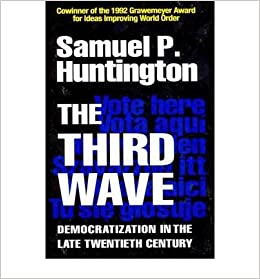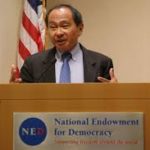 The Third Wave expansion of global democracy was underpinned by the success and durability of democracy in the United States itself — what the political scientist Joseph Nye labels its “soft power,” notes Stanford University’s Francis Fukuyama. People around the world looked up to America’s example as one they sought to emulate, from the students in Tiananmen Square in 1989 to the protesters leading the “color revolutions” in Europe and the Middle East in subsequent decades.
The Third Wave expansion of global democracy was underpinned by the success and durability of democracy in the United States itself — what the political scientist Joseph Nye labels its “soft power,” notes Stanford University’s Francis Fukuyama. People around the world looked up to America’s example as one they sought to emulate, from the students in Tiananmen Square in 1989 to the protesters leading the “color revolutions” in Europe and the Middle East in subsequent decades.
According to Freedom House’s 2021 Freedom in the World report, democracy has been in decline for 15 straight years, a process driven by complex forces, he writes for The New York Times:
Globalization and economic change have left many behind, and a huge cultural divide has emerged between highly educated professionals living in cities and residents of smaller towns with more traditional values. The rise of the internet has weakened elite control over information; we have always disagreed over values, but we now live in separate factual universes. And the desire to belong and have one’s dignity affirmed are often more powerful forces than economic self-interest.
The Demand Side of Democratic Backsliding
The experience of democratic backsliding in Poland, especially voters’ failure to punish democratic violations at the ballot box, reflects different understandings of democracy among citizens, and notably a lack of attitudinal consolidation around liberal democratic norms, according to recent research on The Demand Side of Democratic Backsliding. Where deep commitment to liberal democratic norms is not forthcoming, part of the electorate remains vulnerable to political elites who justify democratic violations with majoritarian or even authoritarian appeals, say researchers Natasha Wunsch, Marc S. Jacob and Laurenz Derksen.

Former NED board member Francis Fukuyama
The world thus looks very different from the way it did roughly 30 years ago, when the former Soviet Union collapsed. There were two key factors I underestimated back then, adds Fukuyama, a former National Endowment for Democracy board member:
- first, the difficulty of creating not just democracy, but also a modern, impartial, uncorrupt state;
- second, the possibility of political decay in advanced democracies.
Fmr @NEDemocracy board member @FukuyamaFrancis @StanfordCDDRL underestimated the difficulty of creating not just democracy, but a modern, impartial, uncorrupt state; & the possibility of political decay in advanced democracies, he writes for @nytimes https://t.co/p3seMMmyND
— Democracy Digest (@demdigest) January 5, 2022







